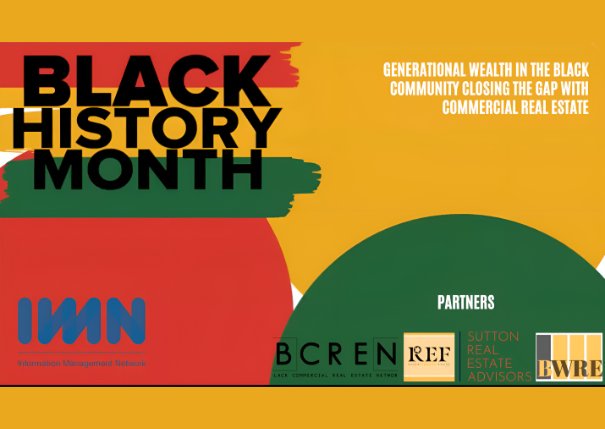On February 28th, I was privileged to participate on a IMN panel titled Generational Wealth in the Black Community: Closing the Gap. I use the word privileged because the opportunity to participate in THIS conversation right NOW couldn’t be more important. It’s been over two years since George Floyd’s death and the question on many professionals of color’s minds, me included, is “has anything changed for the better?”
In the aftermath of that tragedy, many of America’s largest corporations doubled down on commitments to address the deep racial inequities that still plague this nation. Many Fortune 500 companies made pledges in areas like recruitment, seeking more diverse talent for senior management and board seats, as well as incorporating diversity and inclusion roles in their organizations, and revising their policies around third-party procurement.
The real estate industry has been no different, with groups like Project Destined formed to deepen the CRE pipeline amongst professionals of color, impact -oriented lenders like LISC and Capital Impact establishing cohorts to incubate black and brown developers, and sizeable investment managers committing to making more targeted investments in diverse sponsors. Such announcements have been met by many (including myself) with a mix of elation, relief, and still, healthy skepticism.
In that context, the panelists had a conversation, intended above all, to answer difficult questions around how professionals of color can leverage real estate to build sustainable wealth both individually and collectively. Dustin Sutton, CEO of Sutton Real Estate Advisors, moderated the panel, which also included Arnold L. Martin, CEO of Absolute Mortgage Lending.
From the onset, the conversation offered a reminder of just how powerful a tool real estate can be in building lasting family legacies. “My story actually dates back to 1857,” Martin, explained. “The reason being my great grandfather purchased 100 acres of land in Mississippi. My mother grew up on the land and we actually still have the land in the family to this day. One of the things we’re looking into right now is turning a large portion of it into a solar farm.”
Stories like Martin’s are inspirational, but the panelists agreed that without exposure, education, and mentorship, most people of color won’t have the tools necessary to excel in the industry. That’s why programs like Project REAP (Real Estate Associate Program) and SEO (Sponsors for Educational Opportunity), are critical. Case in point, I am a SEO alum, and DLS co-founder Eric Andrew is a REAP alum.
Another major focus on the conversation centered around access to capital, or a lack thereof. Duston laid out the typical challenge newer operators often encounter. “The catch 22 is that people just starting out don’t have the equity, so they focus on smaller deals. Then they try to do the bigger deals but don’t have the experience to convince the big investment shops to step in.”
This pattern has helped steer many diverse operators to “go it alone,” bootstrapping their way one deal at a time, until they become big enough to approach institutional investors. Unfortunately, the reality is most never scale and for those that do, it can take years, even decades, and often after multi-year stints at large development or investments firms.
My view is that this old school approach, while understandable, is no longer necessary…or productive. Diverse communities now have enough intellectual AND monetary capital amongst themselves, to pursue large, impactful projects, through deliberate collaboration and partnership. From the church that owns land but does not know how to develop it, to the professional athlete that has capital but no time to manage a project, to the former Wall Street analyst that model in his/her sleep. When working in lock step, these relationships can drive partnerships that can attract the institutional capital that has long been so elusive for so many.
At the core of such an undertaking, however, is developing greater awareness around where we add value and leaning into that strength. An operator lacking capital, can still be an incredibly valuable joint venture partner if they broadcast their indispensability, via creating deal flow or streamlining the permit-approval process, for instance.
Martin solidified the point. “The bottom line is that when deals need to be done and you need the local councilman and other people to sign off on it, if they don’t know who you are, you know it’s challenging. So, one of the things that I highly recommend is that people get involved in your local community, through the different boards and commissions. It’s a way for you to infuse yourself within your community.” Similarly, Dustin argued that support is available for minority sponsors, but if they become too discouraged prematurely by the lack of representation in the industry or too inflexible on where help comes from, they may never experience it.
He commented “I’m doing a deal with a condo developer. He really cut his teeth by going to the different meetings of the commercial real estate. You know, organizations, and he met all types of people, black, white, and brown, but mostly white, who many of which were willing to mentor him. He said when he showed, often he was the only black person in the room, to his sadness. But on the other side of it he stood out, and he made those connections that led to his first development deal.”
One of the most poignant topics raised during the discussion was whether any of the initiatives announced by large banks and investment managers to expand access to capital for minority investors and homebuyers had produced any meaningful results. Sadly, the silence in the room was deafening. Of the approximately 100 attendees, no one could speak to their impact or personally knew anyone that benefited. To say this represented a teachable moment for these firms would be a grand understatement. Whether due to a lukewarm commitment to achieving such goals or a failure to properly communicate progress to date, sadly these companies have only deepened the level of distrust and disconnectedness most minorities feel towards them.
Even so, such disappointments should not overshadow the fact that many CDFIs (community development financial institutions) that have been funding diverse sponsors for years. And DLS, the capital advisory practice I co-founded, works with several private equity funds that do HAVE proven track records of investing in minority and women led companies.
All told, the major takeaway I hope the attendees were left with is that even in the face of structural headwinds and mixed results from corporate America, diverse real estate operators are still uniquely positioned, by virtue of their significant intellectual, experiential, and monetary capital to excel in real estate, but only if they truly embrace a spirit of collaboration and partnership. The strong attendance from the event left me encouraged that this commitment, unlike others, will go much deeper than words.
Written by Vernon Beckford at [email protected]



